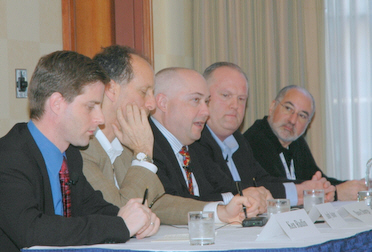Commercializing open source--make it transparent

Commercialization of open source--and Oracle's recent foray into acquiring open source components--was a major theme at the Open Source Business Conference. During a panel on the topic, Ken Jacobs, vice president of product strategy for servers, proclaimed that commercialization is not only beneficial but inevitable. Oracle has recently been on an open source software buying binge, with Innodb and Sleepcat in the bag, and possibly Zend and JBoss in the works. “For customers it means endless good things—more support resources, viability and integration with rest of the environment,” Jacobs said. “For us the good things are serving new customers and reaching new markets and gaining credibility in the open source world.”
Curtis Edge, CIO of The Christian Science Monitor, expressed concern that open source consolidation could lead to software bureaucracy. “It needs to be transparent from all aspects…and not get to a point where to get new functionality you have to go through the bureaucracy of huge organizations. You need to continue to maintain the spirit of inventorship on the open source side and apply some of the strengths of companies like Oracle—don’t lock out the community or transparency,” Edge said.

From left: Ken Rudin, CEO LucidEra; Andy Astor, CEO Enterprise DB; Dave Dargo, SVP of strategy and CTO of Ingres; Curtis Edge, CIO, The Christian Science Monitor; and Ken Jacobs, vice president of product strategy for servers at Oracle
Jacobs said the companies are at risk if they think they can compete with open source or view it as a threat. “It will benefit those who seek to understand and participate, and rise to the level of the expectations of customers,” Jacobs said. “Quite frankly, Oracle has a lot to learn…if we are smart enough to understand [open source], it will bring new customers and provide an on-ramp to our technology and sell more service and support, and help open source communities have greater presence in the enterprise market.”
Ken Rudin, CEO of LucidEra and a former Siebel and Salesforce.com executive, predictably said that the companies most challenged by open source are biggest. “It’s a company genetics thing,” he said. As part of that cultural shift, traditional companies haven't tapped into the responsiveness of communities. “There is nothing worse than calling a vendor and waiting, as opposed to putting questions out there and having someone who wrote the code respond," Rudin said. "There’s great fruit to bear from Oracle and others getting into it, but it’s still about us [customers] not them."